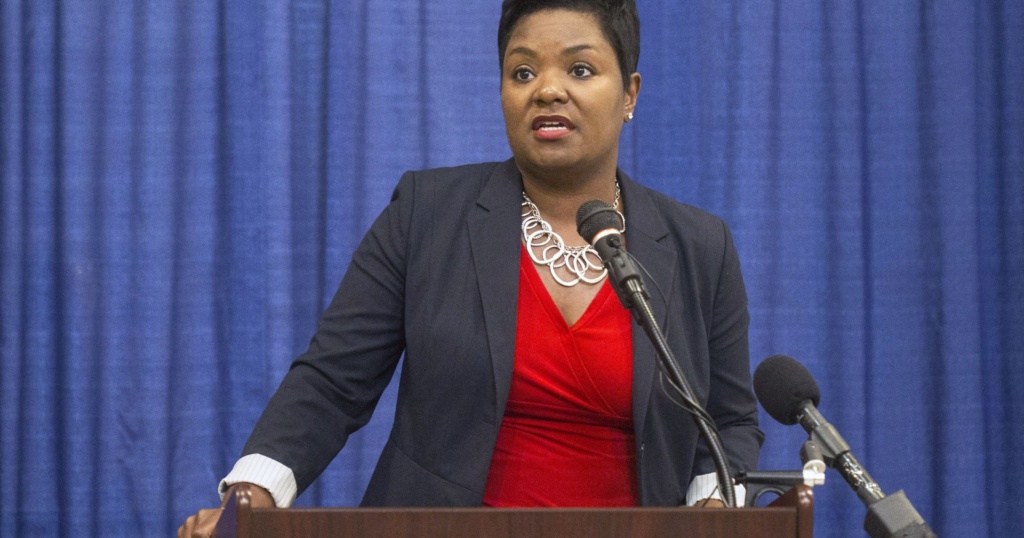Louisville’s black population faces “aspiration-crushing” pressures in terms of jobs and other opportunities due to decades of policies that have denied them access to wealth, Sadiqa Reynolds, president and CEO of the Urban League, said in a new report released Friday.
“There can be no peace without justice and no justice without truth,” Reynolds said in the opening essay of the 2018 State of Black Louisville, which the civil rights organization unveiled at an event with local stakeholders at the Speed Art Museum.
“In fact, Louisville must tell the truth of its history and begin to deal with the real effects of discrimination, redlining, bias and dog whistles,” she added.
The 172-page report dives into a number of issues that look at racial disparities surrounding jobs, education, housing and more. It also contains a host of essays by prominent African Americans and others that offer strong and challenging calls to action on how to move policy solutions forward.
Reynolds, who is the first woman to lead the Louisville branch of the Urban League, presses on how economic self-reliance involves a serious discussion with the community’s leaders on how wealth opportunities for black businesses and organizations aren’t shared equally.
Louisville Metro’s poverty rates, the report shows, say that 35 percent of blacks are living at or below the poverty line compared to 15 percent of whites.
“Our lack of wealth is not indicative of a lack of creativity, ideas, solutions or effort,” Reynolds said.
The Urban League was successful in getting one of its economic development ideas approved last year when the city chose the organization’s plans to redevelop an empty lot near 30th and West Market streets into a 4,000-seat indoor track and field facility.
But Reynolds asserts in her essay that access to capital opportunities such as that are limited for most African Americans locally. She said “when it comes, it is directive and sparse” and that those organizations who are invited to the table aren’t, “empowered to disagree or set our own course.”
Highlights of the Urban League report are below:
Jobs and opportunities
In 2016, the report finds, the jobless rate for black Louisvillians was 11 percent, which was more than double of that for their white counterparts at 5 percent.
Using the University of Louisville as an example, the report also examines the quality of jobs that African Americans hold.
Blacks are sparsely represented in the faculty, staff and administrative positions at U of L. As of 2015, blacks made up just 8.5 percent of key positions in the president’s office while filling 52.7 percent in maintenance and service roles.
Urban League leaders say public and private sector employers should fully fund and support their programs and others aimed at lowering unemployment and recruitment.
Voter disenfranchisement
The Urban League says local leaders must be concerned with mass incarceration in Kentucky, where blacks make up 8 percent of the population but 29 percent of the prison population.
The report takes aim at how due to state rules on felons losing their voting rights, 26 percent of African Americans are disenfranchised, which is the highest voter rate for blacks in the country. It recommends black-led civic groups work with other partners to lobby for the automatic restoration of voting rights.
Black political representation has also slightly receded on the Metro Council and there are only four blacks in the state legislature out of Louisville. It calls for local groups to work together and create a “black candidate pipeline” of formalized recruitment and training.
Accept charter schools
Much has been said about Jefferson County Public Schools and its achievement gap, school-to-prison pipeline and disciplinary differences along lines of race.
The Urban League report doesn’t gloss over those points, pointing out how less than half of the black students who graduate from JCPS went to college in 2016, according to the report. And last year it found that 40 percent of black students were college-ready compared to 70 percent of whites.
Nothing in the report endorses charters schools outright but it acknowledges changes in state law will make them a part of Kentucky’s education reality by the 2018-19 school year.
“We need to get ahead of the game by attending the planning meetings, research which models have worked for our children and develop an agenda,” the report says.
The West End is bad for your health
Two researchers from U of L’s school of health say that it is alarming how different health outcomes are in the two miles east and west from downtown.
Life expectancy in western Louisville is about 67 years of age whereas it is 82 years in the eastern half of the community, according to the report.
Looking at some of the rates for the causes of death the Urban League found alcohol and drug-related deaths are eight times higher; diabetes is six times higher; stroke is three times higher; and homicide is more than 1,000 times higher in the West End versus the East End.
“The facts are indisputable: being black in west Louisville is detrimental to your health,” the report says.
Reporter Phillip M. Bailey can be reached at 502-582-4475 or 502-582-4475. Support strong local journalism by subscribing today: www.courier-journal.com/philb.


0 Comments